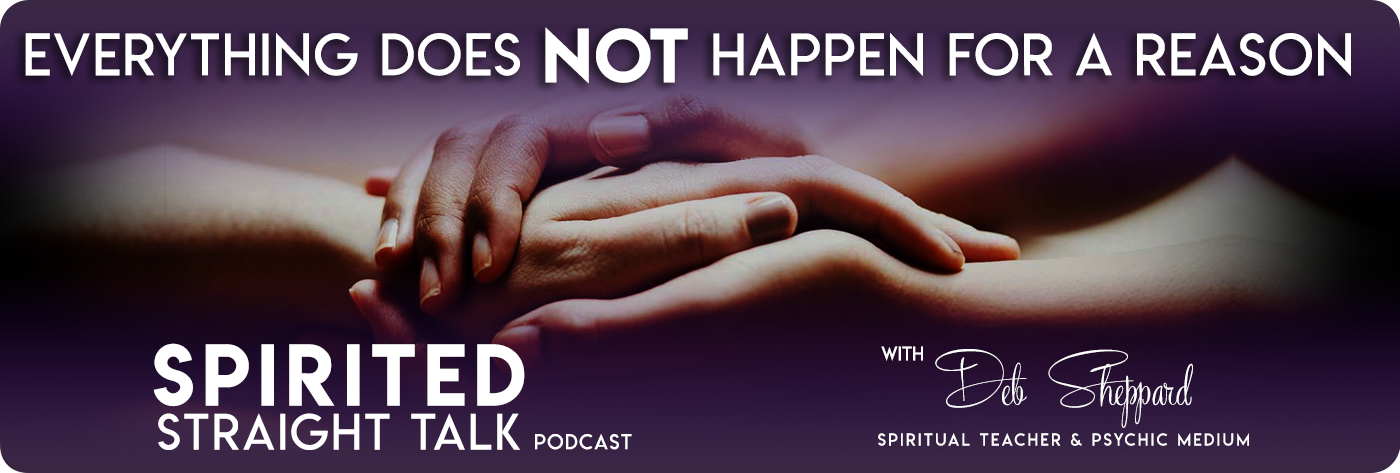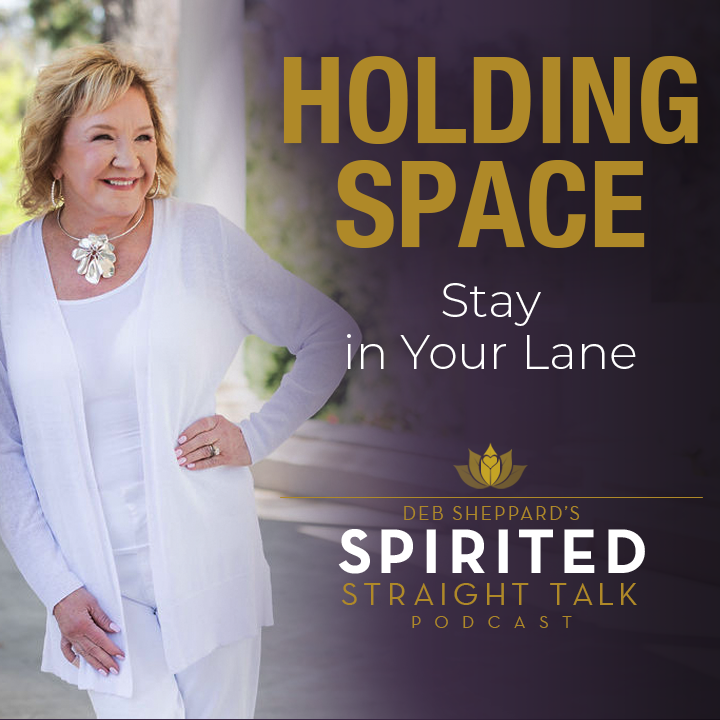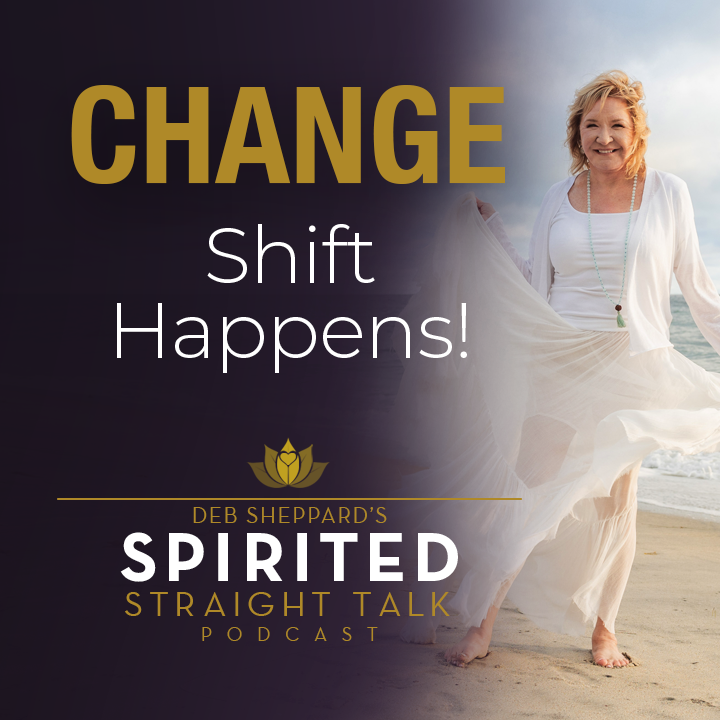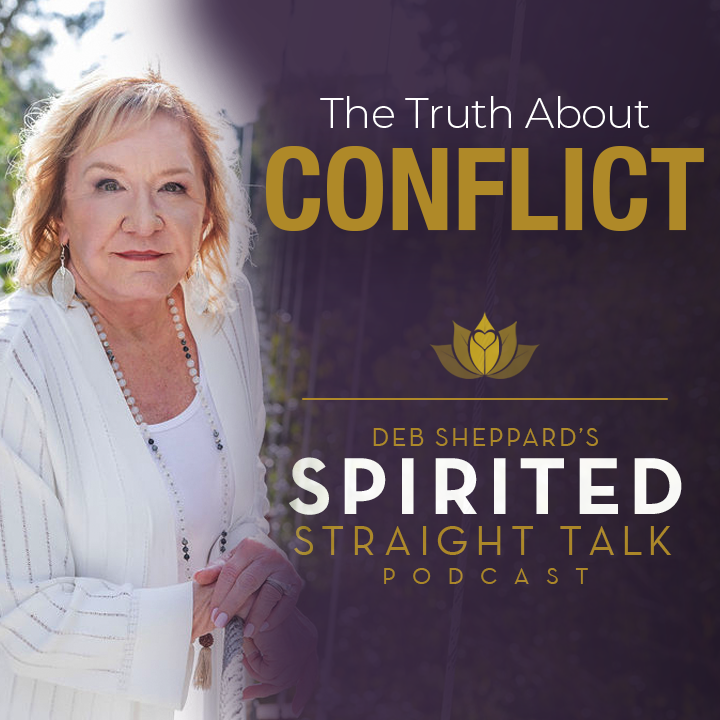
Everything Does NOT Happen For a Reason
Deb (6s):
Welcome to spirited straight talk the ultimate podcast for anyone who is ready to live a life with intention and help from spirit. I am your host, Deb shepherd, spiritual teacher, medium and author helping you open up to the whole enchilada. We like to say the soul enchilada so you can truly make your soul rise. So let’s go! Hey Dana. So were here again on our podcasts with the topics that people have heard a lot, and we hear these people say it, it it all the time, and I’m sure our audience has heard of it. It probably even said it well, it’s supposed to happen for a reason.
Deb (50s):
Yeah, no, I’m so glad that it happened for a reason.
Dana (52s):
This is in your book. You talk quite a bit about this in Grieving to B
Deb (1m 3s):
Correct. And sometimes we just don’t know what to say, which will talk about, but people will say that there is a reason for why this happened or isn’t this cool that this happened, that it, it must be a reason for it. So, you know, whether it’s good or bad people use that as a, I’m going to say as a tagline many times, and they don’t realize the impact it can have for people that have been devastated by something. And so this is what I want to go today is, you know, some families have been devastated by loss illnesses, you know, job and money and situations. And they’re wondering, what did this happen for? What, or this happened to me? Is there a reason for this?
Deb (1m 43s):
And I think it brings up some guilt and shame. And as we talked about it in one of our previous podcast, is it karma? And I’m not a believer in that idea of what our idea of punishment. And so for me, people come to me because they’ve had a devastating loss and they’re trying to figure out why did this happen to them? And when we put that, you know, blanket comment, well, there must be a reason. It doesn’t really help anyone heal.
Dana (2m 9s):
I think some people might put this type of belief system to their own loss because it helps them feel better, correct. By saying, oh, well, you know, they must have had to go for a reason when they’ve lost a loved one or something like that. But I think that that may make certain people feel better
Deb (2m 31s):
and there’s nothing wrong with using it.
Dana (2m 33s):
Right. But there’s another side of this, right.
Deb (2m 36s):
Especially when someone is in the middle of a loss or grief, it’s not really a tool that can be helpful cause they’re trying to figure out what was the purpose of it. Right. And I’ve always believed that when we’ve had a devastating loss, that we can make a purpose from what has happened to us.
Dana (2m 54s):
So maybe if you can make a purpose from that.
Deb (2m 57s):
Correct. And so maybe that’s the reason that happened and not everyone’s gonna do that. But I know for me, when my husband suicided my nephew, I’ve had cousins and friends and that’s something that a lot of people come to me about it because of the loss of suicide. So of course, as you mentioned, my book talks about this, but not the only topic, but about mental health. I’ve been in a, you know, so many platforms regarding the mental health and suicide. And so I wouldn’t probably have been involved in these things if it,
Dana (3m 25s):
how do you mean by platforms?
Deb (3m 27s):
I’m so the suicide awarenessvgroup.
Dana (3m 31s):
So you’re, you’re talking about all the things that you’ve gotten involved with it because of your experiences?
Deb (3m 38s):
Yes. I’ve been invited to be a speaker because you become an expert. When you write a book about it, people would know that you’ve experienced these things. So I can make a purpose from this mental health and the suicides that have been in my life. But I don’t believe that these people died for a reason. I created a purpose from that. And I know that I’ve had a lot of people that I’ve been involved with or that we’ve seen. Candice Lightner is the founder of the mothers against drunk drivers. And her daughter actually went to school with my sister-in-law Lisa and they’d played a baseball team or softball game the night before, the day before that she died.
Dana (4m 13s):
Oh, wow.
Deb (4m 14s):
But the driver had many DUIs. And at that time, people only got to slap on the hand.
Dana (4m 19s):
Yeah.
Deb (4m 19s):
So she created the foundation for mothers against drunk drivers and we all know about it and how it changed the consciousness. It’s true that Marilyn Van Derbur, one of our friends? Yes it’s. And she’s also been on our podcast and she wrote the book, Miss America by Day. And in her case, her father was, she was incest by her father and her sister was, was incested by her father. And she became an advocate after years of figuring this out. And it has been a speaker around the world and they’ve touched lives about, you know, sexual abuse of any type. Doesn’t matter whether it’s been a priest or whether it’s been, you know, it, but whoever. And so she has been pretty amazing regarding that.
Dana (4m 57s):
Yep. So she created a purpose basically from what she experienced in life to help others.
Deb (5m 3s):
Correct. And we know the current one, the #metoo where that has really come to the surface about all these things that’s happened that people thought they couldn’t have a voice about it. So it’s changed. And then of course we’ve have black lives matter. Climate change, animal protection, rights have all been part of it. And then this weekend we’re going to see and be part of the Chelsea Hutchinson foundation. And you’ve been a big part of them. And we’re doing that. The walk and with her situation, her daughter died. It, I think it was 16.
Dana (5m 31s):
Chelsea died from SUDEP, which is sudden unexpected death in epilepsy. Yeah.
Deb (5m 36s):
So she died during her sleep. And so Julie, her mother has become a huge advocate and made a difference through so many people’s lives, by awareness, education, seizure response, dogs, monitors, all of those things to really make a difference. So she did make a difference from her daughter’s death.
Dana (5m 55s):
Right.
Deb (5m 56s):
Did it happen? You know, she made her purpose from the reason that her daughter died, but I would wish, I didn’t know, Julia, if her daughter was still here. So that’s how we have to remember about these things. Yeah. Also I do think that there is a synchronicity where things do line up. And one of the things I was thinking about is let’s say, you’re trying to get to some place, maybe a meeting or pick up your kid and you’re delayed. You can’t find your keys, you are on a phone call longer, and then you able to go and you start to drive there and there is a terrible accident and you go, oh, I’m so glad that it happened to me that I got delayed.
Dana (6m 32s):
because you were delayed yeah. But, or you went a different direction or, you know, I remember one time we were driving and for some reason I went forward instead of turning where we normally turn and we were headed to a radio show.
Deb (6m 46s):
Okay.
Dana (6m 47s):
And so you were kind of in your meditative state and I was driving, but I missed our turn and it turns out had I turned there. It was a big accident just seconds later on the street we were supposed to be on. So, so what you say is that
Deb (7m 3s):
it’s just interesting that we say, oh, well that happened for a reason, but then someone had a car accident up ahead. Yeah. That was devastating. But it’s also honoring the fact that the synchronicities happen for us to be able to be safe or those aha moments, but realizing that other people may be suffering because of that. So it’s creating that balance if understanding that that tagline is the only, that always the best for everybody.
Dana (7m 28s):
Yeah. Like everything for a reason, we hear it so often. And sometimes I hear it and it just grates on my nerves. It’s like nails on the chalkboard. ’cause that expression is like a blanket expression somehow.
Deb (7m 43s):
Correct.
Dana (7m 44s):
And it’s just like, no, not everything happens for a reason. It’s just synchrony. When you talk about the synchronicities. But yeah. I think things line up and then we can see the pattern. Like you say, all the time, we can see where we were led something because of synchronicities or how, what event happened because of synchronicities.
Deb (8m 5s):
But, my big thing is what, how I got into this path. You know, my husband that mediumship mediumship. Yes. My husband did not go get another career in corporate America, or it didn’t happen even though he may applied and all those kinds of things that didn’t happen. And I can look at that and think, well, if he hadn’t gotten, if you would’ve gotten the job, I wouldn’t be here. But it also is very devastating is it did cause his suicide because he never found his way again. But for me, I found a, a purpose. If there is going to be more, let me push it through this. So it allowed me the opening,
Dana (8m 39s):
it opened the door,
Deb (8m 39s):
opened the door that I took and stepped through it. And you can look at that and go, oh, that must have happened for a reason. But it was also a death of a family member.
Dana (8m 48s):
Yeah.
Deb (8m 48s):
So it’s how do we use everything happens for a reason. How do we look at synchronicities? How do we look at people that been devastated by laws and helping them and support them that this isn’t the karma? No one is being punished. People say it a lot of times while it was there, time, or this is the time I’m not in agreement.
Dana (9m 7s):
or God chose them. Which I have a hard time about that one too.
Deb (9m 11s):
Me too.
Dana (9m 12s):
It’s like, no, no, that’s not what it does. It doesn’t make people feel better
Deb (9m 16s):
it that are, or they’re in a better place. So these one liners that we all say to other people is just being aware that this may not always be the best way of helping someone through a hard time. Even yourself, if you’re feeling that you are in this pain and everyone’s telling you you, or you have this belief system that, oh, it must be your reason that this is happened. Throw that in the trash.
Dana (9m 39s):
Yes. So what about when good things happen that was meant to happen?
Deb (9m 43s):
So, yeah, absolutely, but I also think we can create those things. So there is the difference between bad things happening. You know, we have it, was it a body that you can’t endure? A lot of things, whether it’s cancer, whether it’s mental health, a terrible car accident. Yes. So these things are, or agiles is there or fragile if you say yes, they’re fragile. So when things do happen, it, so if someone made a mistake, maybe driving or the fact that our body can’t fight cancer, things like that, knowing that those good things that are happening it’s where is your alignment? We’ve talked about this in the previous podcast. We have three journeys, mind, body, and spirit in which one are we on and are we aligning them? So when we align, when the good things are happening, that means we’re in alignment with the universe.
Deb (10m 25s):
And it doesn’t mean that we’re bad that we’ve had a loss in our live, because that doesn’t mean that person wasn’t alive, aligned with everything. You, it just means I’m excuse me, but shit happens. You know, things happen to us, but I don’t think there’s always a purpose for, for it. But we do create something. We look at all these shootings that are going on and we look at that thinking, and if you look at our admin, our second amendment, our constitution, and then what about the rights? And it’s such a diverse topic. So how do we then say, okay, can we make a purpose from all these losses? And I don’t think that all of those shootings are a purpose because we had mental illness, which is a whole nother topic regarding the gun control and getting guns and things like that.
Deb (11m 8s):
It’s just that balancing of not putting everything in one pot and thinking that one line is a solution for everything or an answer for it.
Dana (11m 15s):
Right? Yeah. I completely agree. And when you, when you think about it or, you know, because this is kind of an eyeopening or mind opening conversations. So when you think about it and you go into that space and you, it opens your mind of a little bit to thinking, you know, well, there, there’s, we are learning as we go through life and we see the synchronicities and we experience things like that, but it’s not always that there’s has to be a reason behind everything.
Deb (11m 48s):
You know, there’s two situations that would have talked about how you are. And I met, you knew my name, who I was years ago. And we both have said, if we would’ve met earlier, it probably wouldn’t have been a partnership where we are today. So we can look at that and go, oh, there’s a reason for that. And we do agree because if we would’ve met earlier or maybe it wouldn’t of happened this way, and we don’t know, right. So there is that saying, well, you know, and we just have some really good friends that their timing of how they got together was a similar thing that if they, if they would have divorced at a different time or things would have happened differently, they wouldn’t have been together now. And so there is that same, well, it happened for a reason. And I agree with that. But if, if what if, if you are, and I would have met a lot earlier, it would probably, it wouldn’t be where we are today
Dana (12m 31s):
if things we’re not aligned for us to meet at that time
Deb (12m 33s):
That’s the difference. Is it, it wasn’t aligned. And so the same, well, it must have happened for a reason. That’s making us feel good that we didn’t waste a lot of time, not meeting each other a lot earlier. It was comforting. And it was a comfort, like, what is that? It would’ve met you earlier verses the pain. It was before hand to meet you, right? Those years you were supposed to use those things. So just the lessons for it. So we eventually aligned to be able to be here. So it’s using that term in a way that is healthy for yourself. And for those people that maybe you are saying these things for it, because it is something that we believe as a word of comfort.
Dana (13m 11s):
Yes. So if you’re one that says this expression a lot, what would you say to that person?
Deb (13m 20s):
I think it was several things you can say is really thinking about how do you support the person you’re saying it to you. So if someone’s been through a devastating situation and you put your hand on their shoulder, if you’re talking to them and go, wow, it must happen. Just, it happened for a reason, is that the best answer for this person? And you may want to turn that around and say, how can I support you? Because yes,
Dana (13m 39s):
you know what just popped into my head when you said that, because we were talking about talking to somebody directly, it must have happened for a reason. Think about it this way. If you and we have many friends who’ve experienced this. If you have a mom that has experienced a pregnancy loss and you look at it and you say there must’ve been a reason how devastating to that mom. So that expression, you can pretty much pop that into anything. And that feeling is what you don’t want to create.
Deb (14m 14s):
Correct. And that’s a big, because when people lose, have it pregnancy loss, whether its six weeks or weather, it’s nine months, that it is the worst thing you can say to the mother, because it doesn’t matter what you feel. Or we even want a doctor buy say, oh, the, the missing something wrong with that person lost a child that they had up there. They’re already deciding on a future for this baby. And you’re saying to them, oh, it happened for a reason. So don’t don’t read or your future, right. Don’t grieve your future.
Dana (14m 44s):
So be aware when you are saying, this is what you said, right.
Deb (14m 48s):
And if someone says it to you, this is the big thing. I think people don’t know what to say when it, when that is shared with them. And so they are thinking, well, what is the Frick? Did this happen for a reason? For what, what am I supposed to learn from this?
Dana (14m 59s):
Right. And it might be the story about Dave. Yes. Yeah. You could have to share that.
Deb (15m 4s):
So David is a really good friend of ours and they have lost two daughters and therefore, so I’m gonna, I’m sharing that because there’s a reason for that. And he, he went to the bank and he was, the lady said, you know, I’m so sorry, you know, for your losses, but it must have happened for a reason. And they’re with God and Dave turned around and said, well, do you want your children to be with God?
Dana (15m 27s):
So what is your rather there, here with you, you.
Deb (15m 29s):
Yes. And then the other thing he said was, or she said, was it at least you have two more,
Dana (15m 35s):
oh geez, yes.
Deb (15m 36s):
You didn’t know that.
Dana (15m 37s):
No.
Deb (15m 38s):
And yes, you do the things that people will say because they are uneducated, when it comes to grief or a loss, and this can even be a divorce, let’s say someone gets divorced. No, it was a toxic marriage. And you go, well, it happened for a reason because of it. No, you married that person or believing it was a life-long commitment or that it was your intention. And your devastated by the failure are how long it took you to make those decisions or what you went through. So it’s important to realize that those, or not always words of comfort and maybe comfort for you personally, but it’s not always comfortable for the person receiving this. So when people are saying that to you and it’s uncomfortable, let them know that, that that’s not comforting. And even say, would you think this is karma or come back to them with one liner that lets them know that, that isn’t a safe sentence to say.
Dana (16m 25s):
And that’s not the way I believe. That’s not the way I believe. You’re, you’re famous for saying thanks for sharing. Thanks for sharing that. This is a kind way of saying, I don’t wanna hear what you don’t wanna hear it.
Deb (16m 38s):
And we were really taught it as, at least in the society that we are in. And I think this is a lot of societies around the world. We don’t know what to say. Yes. And so we just say what we’ve been told or what we’ve heard in the past versus digging a little deeper in thinking, what would I want to hear? How would I be comforted? What would be something that would be encouraging for me? And simplicity is I am so sorry for your loss. What you need from me? What can I, how can I support you? And that person,
Dana (17m 7s):
that’s really all you should say.
Deb (17m 8s):
That’s all You should say and you don’t have too. The person that you’re talking to you, you may not know that they need, at least they know that they’re not being judged or have to go into guilt or shame. Because if this did happen for a reason, am I being punished for my pain and that’s not going to support anybody in their healing process. And you know, I know I’ve said it to the lots of times, even in our relationship, but it’s also a way to have humor that we can look at the past and not have regrets for us personally. But I don’t believe that tragic situations are reason except that we can make a purpose from the tragic situations that we are going through.
Deb (17m 49s):
And it’s figuring out how to heal. I think a lot of us don’t go in to the healing process. Most of my clients or women, or some of them are becoming younger, but a lot of that middle age go, and I don’t want to repeat these patterns anymore. And so that could be it, it keeps happening. So I need to make a change to become more aligned. So we may say this keeps coming up for me. So there must be a reason that’s different because it’s your own personal journey. And what you’re saying to yourself, I need to look at this. But when you tell somebody else what it can, what could happen to them? They project that,
Dana (18m 22s):
they project that, oh, yes, that makes sense. So don’t say it.
Deb (18m 29s):
And if you do it, it can only be about your reasoning, the reasoning it’s, it’s finding that out. That when they’re is tragic situations, it’s helping people say, well, if there’s a reason for this, lets figure it out together. Maybe we can do something in our community is or an oranization that we can join that has already experienced these things that we can be part of now. And that’s really different than putting the shame and guilt on somebody’s. So that’s how we are going to wrap it up is watch your words. Not everything happens for a reason, but we can make a purpose from what’s happened to us. So thank you for joining us again on Spirited Straight Talk.
Dana (19m 7s):
Thank you for joining. Thank You for joining us for this episode of Spirited. Straight Talk. If you enjoy the show, make sure you subscribe to the, you get notified of new shows. We’d also love it. If you’d leave us a review and let’s connect, visit Deb Sheppard dot com for more insights support workshops and to book a session with Deb plus enter to get a free reading with them. All you have to do is sign up for the email list and you’ll automatically be entered or just go to Debsheppard.com. That’s Deb S H E P P a R d.com.




